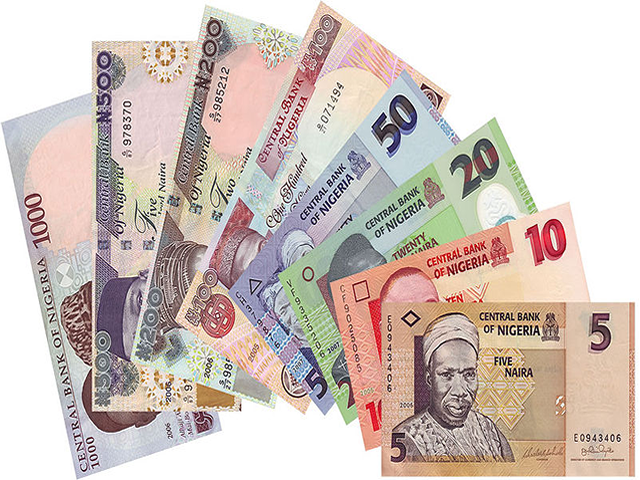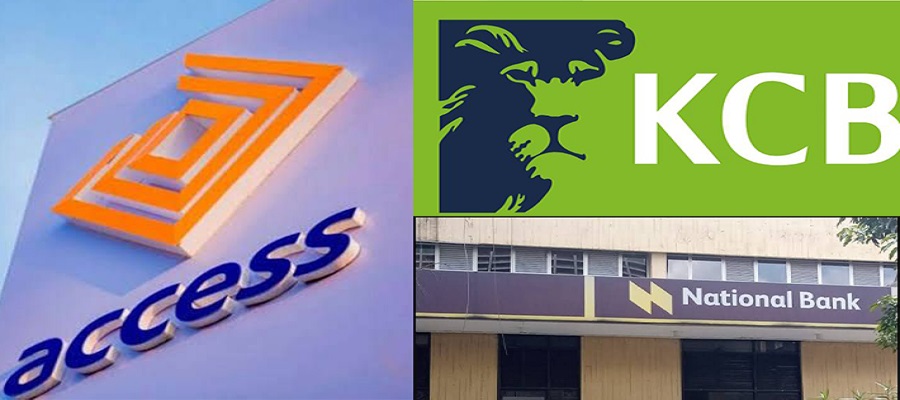E-Financial
Naira Steady Ahead of FOMC Meeting, Oil Pushes Higher

Lukman Otunuga, Research Analyst at FXTM,
The Nigerian Naira was basically flat on the forward markets, despite the Dollar depreciating on expectations that the Federal Reserve will be adopting a dovish stance this week.
Investors with an interest in the Naira will be closely monitoring the FOMC meeting this week, which has the potential to impact the emerging market currency. Buying sentiment towards the Naira is likely to jump if the Federal Reserve adopts a dovish stance towards rates and expresses concerns over the US economy.
The Naira also remains influenced by Oil prices, as a fair chunk of Nigeria’s export revenues come from Oil sales. Although rising Oil prices will be a welcome development for the Naira in the near-term, the currency’s outlook remains impacted by domestic conditions at home and geopolitical risk factors across the globe. The next major event risk for the Nigerian economy will be in Central Bank of Nigeria’s interest rate decision next Tuesday. Will the CBN drop hints of a possible rate cut some time in the future? This is a question on the minds of investors.
Brexit chaos deepens as Commons Speaker derails third vote on May’s deal
The British Pound fell yesterday afternoon after the House of Commons Speaker John Bercow essentially banned Theresa May’s Brexit deal from getting a third vote. Although prices later recovered, this once again highlights the tremendously fluid Brexit equation that markets have to contend with. Now, all eyes turn to the summit in Brussels on Thursday, where EU leaders will have their say on an extension to Brexit. It’s key to note that the extension has to be unanimously agreed upon by all 27 member nations before a no-deal Brexit can be safely removed from the table; should just one of the EU members reject reasons for the deadline extension, the Pound will most likely find itself exposed to significant downside risks.
With the prolonged moving nature and fluidity of the Brexit situation weighing heavily on sentiment, Sterling remains at risk of unwinding its year-to-date gains. Still, the base case that markets are pricing in is one of a delayed Brexit, which may only happen in 2020. However, as we have learned in recent weeks more time may not wholly be a good thing, as it could also bring about extended periods of uncertainty and potentially more permutations to the final Brexit outcome. Barring any more surprises, expect the Pound to trade range-bound this week.
Commodity spotlight – WTI Oil
WTI Crude found comfort near its highest levels so far this year, after OPEC+ assured markets that its members will stick to the output cuts through the first half of 2019. Saudi Energy Minister Khalid Al-Falih says there remains a “significant glut” in global supplies which still needs to be drawn down before considering scaling back on production cuts, a move that’s supportive of Oil prices. OPEC+ producers need to demonstrate unified efforts in their attempts to rebalance the Oil markets and to have any chance of offsetting record US Shale production.
Between now and the OPEC meeting scheduled to take place in Vienna in June, markets will certainly be closely monitoring indicators on global supply and demand. With US shale production still robust as ever, oversupply fears are likely to linger in the background. However, sanctions on other Oil producers, namely Iran and Venezuela, may sooth such concerns. Meanwhile on the demand side, should global growth show more obvious signs of faltering, this may open up more downside for Oil.
E-Financial
CBN Pumps in Additional $150m into Forex Market to Safeguard Naira

Central Bank of Nigeria (CBN) has reportedly injected $150 million into the foreign exchange market at the beginning of the week to keep the naira safe under pressure.

With sustained forex market intervention, a slew of analysts have formed a consensus that the exchange rate would trade range-bound in the second quarter.
Last week, the Apex Bank sold $635 million to authorized dealer banks in FX market amidst efforts to strengthen liquidity levels in the market.
A potential slowdown in US dollar supply could trigger negative exchange rate movement, according to analysts.
Again, the naira faced another round of demand pressure in the official window as offshore investors continued to exit positions in naira assets.
To stem the negative impacts of unusually high demand for US dollars, the CBN intervened with a sale of $150 million at rates between $/₦1,593.20 and $/₦1,623. Throughout the session, the USD/NGN pair moved within a range of $/₦1,593.10 to $/₦1,630, AIICO Capital Limited reported.
Data from the CBN showed that gross external reserves fell to $38 billion in the absence of additional inflows and a slowdown in oil FX receipts.
In the global commodity market, oil prices fell on Monday despite some positive signals, including exemptions for electronics from U.S. tariffs and a sharp rebound in China’s March crude imports.
These factors were overshadowed by ongoing fears that the prolonged U.S.-China trade war could hurt global economic growth and weaken fuel demand. Brent crude dropped 42 cents, or 0.65%, to $64.34 a barrel, while U.S. West Texas Intermediate (WTI) crude slid 53 cents, or 0.9%, to $60.97.
Meanwhile, gold prices declined over 1% after reaching a new record earlier in the day.
Improved risk sentiment following the tariff exemptions on smartphones and computers contributed to the dip. Spot gold fell 1.1% to $3,200.11, while U.S. gold futures declined 0.9% to $3,216.20. #CBN Injects Additional $150m into FX Market to Safe Naira First Holdco Falls below N1 Trillion in Equities Market
E-Financial
Kenyan CBN Okays Access Bank Full Acquisition Of NBK

Access Bank, a subsidiary of Nigeria’s Access Holdings Plc, has received final regulatory approvals to acquire 100 per cent shareholding of the National Bank of Kenya (NBK), marking a significant milestone in the lender’s strategic expansion across East Africa.

The Central Bank of Kenya (CBK) confirmed on Monday that it granted approval for the transaction on April 4, 2025, under Section 13(4) of the Banking Act.
In a coordinated move, Kenya’s Cabinet Secretary for the National Treasury and Economic Planning also gave the green light on April 10, 2025, pursuant to Section 9 of the same Act.
Access Bank is acquiring NBK through a full purchase of shares from KCB Group Plc, which has held complete ownership of the bank since 2019.
As part of the acquisition, selected assets and liabilities of NBK will be transferred to KCB Bank Kenya Limited, a wholly owned subsidiary of KCB Group.
The CBK and the Treasury have both approved this transfer as an integral component of the broader transaction.
According to CBK, the acquisition will be finalized upon the full completion of agreed terms between Access Bank and KCB Group. Once completed, Access Bank will officially own and operate NBK, positioning itself as a stronger competitor within Kenya’s dynamic financial services landscape.
The acquisition of NBK aligns with Access Bank’s long-term strategy to scale operations in East Africa and deepen its presence in Kenya, one of the continent’s most competitive banking markets.
The move is expected to enhance Access Bank’s capacity to deliver innovative digital and financial solutions to a broader customer base in the region.
The CBK welcomed the acquisition, stating that the transaction is consistent with its objective to promote the development of a sound, stable, and inclusive financial sector.
The regulator expressed confidence in Access Bank’s capability to ensure continuity of services at NBK while strengthening financial resilience in the market.
“The acquisition will enable Access Bank to leverage NBK’s infrastructure and customer base, thereby enhancing service delivery and financial inclusion in Kenya,” the CBK noted.
Access Bank’s expansion reflects a broader trend of cross-border banking consolidation in Africa, as regional financial institutions seek to build scale, diversify risk, and foster long-term growth across key markets.
E-Financial
SEC Says CBEX, other Unregistered Digital Platforms are Illegal

Securities Exchange Commission (SEC) has charged all fintechs, cryptocurrency firms and exchanges to register with the commission. This is coming weeks after President Bola Tinubu assented the Investments and Securities Act 2024 into law, making its provisions officially enforceable.

Dr Emomotimi Agama, DG, SEC
“If you are not registered with the SEC, you are illegal,” Dr Emomotimi Agama, director general, SEC, said during a virtual engagement that held yesterday.
“Registration is the hallmark of regulation. If there is no registration, there is a violation. Hence, we all must educate ourselves and clear any doubt in the process of building a strong Fintech ecosystem.”
The desire to fast-track digital asset licensing and registration is slowly becoming a core mandate for Agama in 2025.
This turnaround is quite significant from 2021, when the rise of cryptocurrency was stalled by several bans, hurting the growth of the sector.
However, the SEC boss is determined to avoid sharp practices and safeguard investors from pump and dump schemes, ponzi schemes and volatile meme coins introduced by celebrities.
Last year, the commission warned the general public against meme coins introduced by African singer and songwriter, Davido.
For the digital asset providers seeking licensing who have not yet gotten a response, Agama noted that work has been happening underground.
“We have observed some significant issues which we need to take care of. Some of the new applications need a level 3 due diligence before getting a provisional license. It must have taken longer than necessary. However, what we are trying to do is to make sure that every gap is covered.”

 E-Business2 days ago
E-Business2 days agoNITDA Warns Against Fake Google Play Store

 General News2 days ago
General News2 days agoLagos Commences Integration of NIN with State Single Social Register

 News2 days ago
News2 days agoNOA Uncovers Fraud by Banks, Universities in Students Loan Scheme

 E-Financial2 days ago
E-Financial2 days agoUBA Redefines Banking with Next-Gen PoS Terminals and Revamped MONI App

 E-Financial2 days ago
E-Financial2 days agoNIBSS Heads to Court to Recover N4Bn Lost due to System Glitch

 E-Financial2 days ago
E-Financial2 days agoAfrica Loses $88.6Bn Yearly to Corruption- ECOWAS

 E-Financial2 days ago
E-Financial2 days agoSEC Bans Unregistered Digital Asset Exchanges, Online Forex Platforms

 General News2 days ago
General News2 days agoNigeria Records $6.83Bn Balance of Payments Surplus in 2024 Amid Economic Reforms























